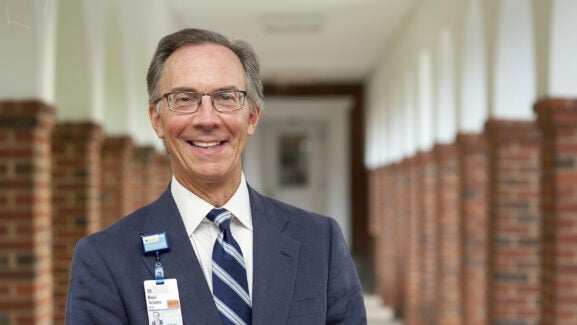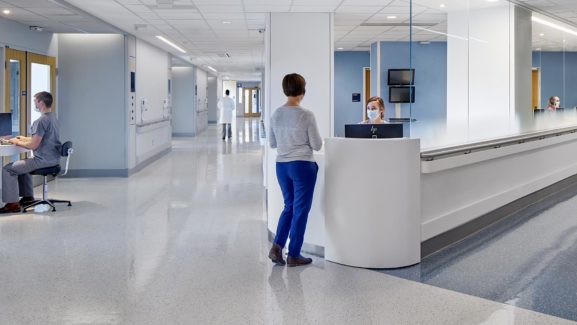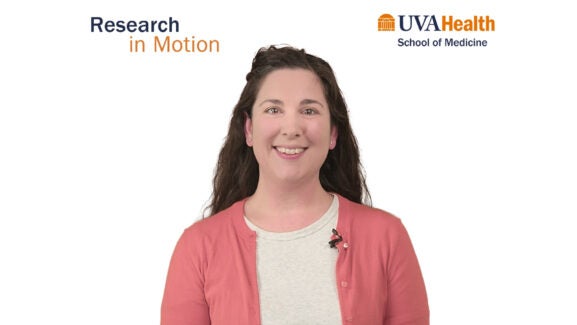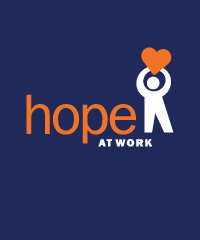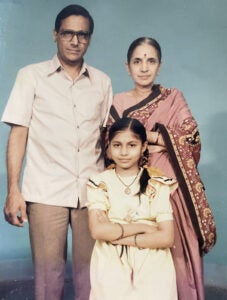
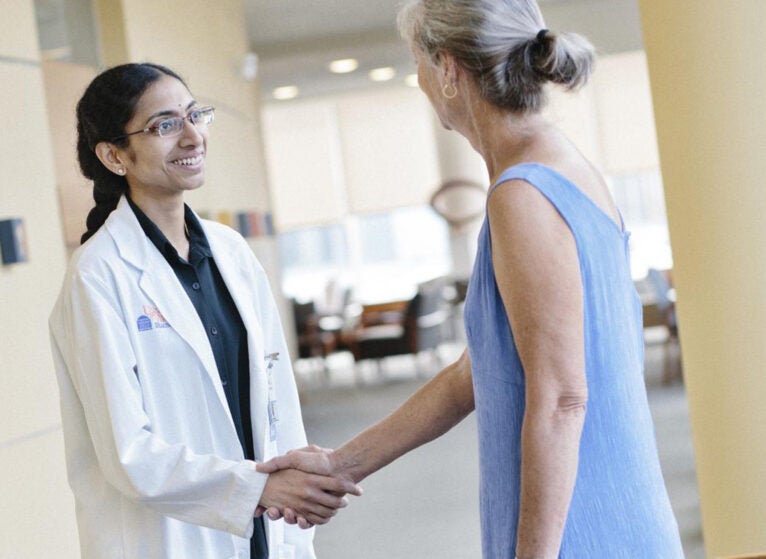
Photo by Jackson Smith
Hope at Work: UVA Health Hematologist-Oncologist’s Personal Loss Drives Mission to Expand Lifesaving Cancer Care
This is the latest installment in our Connect article series “Hope at Work” — showcasing inspiring stories about how our team members contribute to UVA Health’s 10-year strategic plan: “One Future Together Health and Hope for All.” No matter where you work, you have an opportunity to inspire hope in others. These stories show how.
September is Blood Cancer Awareness Month:
"She was only 66 and in excellent shape, but we did not have access to a transplant in India," recalls Indumathy Varadarajan, MD, of her personal loss that continues to shape her work today at UVA Health.
The hematologist-oncologist's maternal grandmother died from acute leukemia, a cancer of the blood-forming tissues.
“She was incredibly close to me and raised me during my childhood,” says Dr. Varadarajan, who grew up in India, graduated from medical school, and moved to the United States.
She completed her residency at Mount Auburn Hospital — the teaching hospital of Harvard Medical School — then pursued a hematology/oncology fellowship at Drexel University/Hahnemann University, followed by a year of specialized training in bone marrow transplantation and cellular immunotherapy.
In 2018, Dr. Varadarajan joined the Division of Hematology and Oncology at UVA School of Medicine. At UVA Health, she specializes in stem cell transplantation and CAR-T (chimeric antigen receptor-T) cell therapy, defined as altering the genes in a person’s T cells, a type of white blood cell — to help attack cancer cells.
Dr. Varajaradan's loss drives her commitment to expanding access to cutting-edge treatments such as cellular immunotherapy — so more families don’t have to face the same barriers.
Collaborative Approach
As a part of the bone marrow transplantation team at UVA Comprehensive Cancer Center she understands innovative treatments mean little if they do not reach the patients who need them — so she's embraced a collaborative approach to cancer care education.
Through her partnership with Binaytara — an oncology nonprofit based in Bellevue, Washington — Dr. Varadarajan co-chaired the Virginia Hematology Conference on Aug. 25 in Richmond with Keri Maher, DO, from VCU Massey Cancer Center.
Real-World Applications | Dramatic Advances
The conference, this year featuring the theme "Practical Perspectives for Patient-Centered Care," reflects Dr. Varadarajan's belief that academic advances must translate into real-world applications. It's designed specifically to bridge the gap between academic centers and community practice. "The resources available in an academic center often aren’t available in the community," Dr. Varadarajan explains. "In academic centers, most physicians are disease-specific experts, but our colleagues in the community may not have that kind of resource on a day-to-day basis."
By co-chairing this conference, Dr. Varadarajan offered practical strategies that community clinicians can apply in everyday patient care — particularly how to translate the latest phase III data into real-world clinical practice. "Completing my primary medical education in India and coming to the United States to pursue a medical career — I am very well aware of the impact of the financial and social factors on healthcare."
She adds, "Recent advances are changing the landscape dramatically. In the last five years, we’ve had multiple studies showing you don’t need a complete match to perform a transplant. You can perform it even if you have a 70 or 80% match. That opens up a lot of doors for patients — regardless of background — and gives them an opportunity for curative therapy."
Dr. Varadarajan is leading a clinical trial at UVA Health including the Alpha 3 study — an off-the-shelf CD19 CAR-T cell therapy for patients who are MRD (minimal residual disease) positive after the first line of therapy for non-Hodgkin lymphoma — and studies to treat Chronic Graft-Versus-Host disease.
Learn more about UVA Health’s multidisciplinary blood cancer program, which accepts patient referrals from across Virginia.
Latest News

